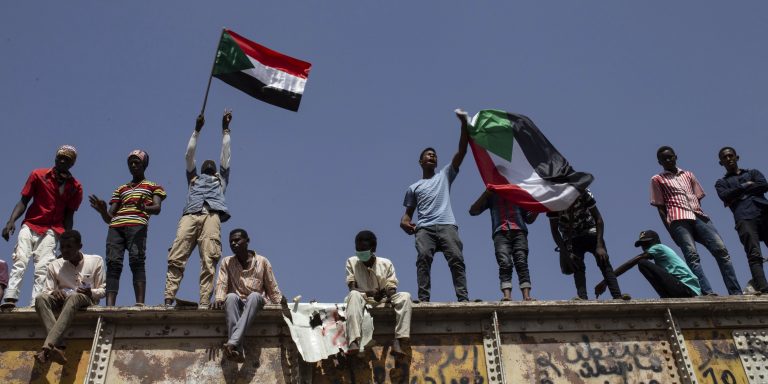INTELBRIEF
May 8, 2019
IntelBrief: The Struggle for Sudan Spills Across Borders

- On May 6, the African Union (AU) and the United Nations (UN) once again pushed for a transfer to civilian rule in Sudan.
- While the AU and the UN are pushing Khartoum to transition away from strongman rule, regional powers are seeking to guard their own interests.
- Fearing the spread of protests, Riyadh and Abu Dhabi are supporting the Transitional Military Council to protect the status quo as much as possible.
- Meanwhile, throughout the Muslim holy month of Ramadan, thousands of Sudanese civilians continue to protest outside the army’s main headquarters.
.
When widespread popular protests toppled the 30-year rule of Sudanese dictator Omar al-Bashir on April 11, great optimism enveloped the country, ushering in the hope that organic and democratic change had finally arrived. That optimism remains almost a month after Bashir left office, but it is being tempered by the role of external actors seeking to forestall an 'Arab Spring 2.0' sweeping the region. Thousands of Sudanese continue to protest for civilian rule, gathering in front of the military headquarters in Khartoum where the interim military government is based. The protesters are continuing even during the month of Ramadan, where fasting makes outdoor protests in the Khartoum heat a notable choice. The Transitional Military Council (TMC) and the protesters have been unable to forge a tenable consensus in creating a civilian government or a joint military-civilian government. Given recent history in the region, and ongoing interference by external actors, it seems likely that a delay would favor entrenched powers, which by default in Sudan means the military.
The African Union (AU) and United Nations (UN) have been calling for a relatively quick transition to civilian rule in Sudan. The AU set a 60-day deadline for the TMC to transfer power to a civilian government, extending the deadline by 45 days from its initial demand. On May 6, AU Commission Chairman Mahamat met with UN Secretary-General Guterres to jointly call for a quick transition to a civilian-led government. Yet regional heavyweights like Saudi Arabia and the United Arab Emirates (UAE) find the idea of a prolonged military government in Sudan amenable to their countries’ interests. The two have pledged a $3 billion aid package designed to bolster the TMC and effectively shield it from the economic pressures that contributed to Bashir being ousted. Riyadh and Abu Dhabi both share an interest in 'stability’ in Sudan, which means trying to ensure that the protests do not spread beyond Sudan’s borders, particularly to the Gulf or other parts of the Middle East and North Africa where Mohammed bin Salman and Mohammed bin Zayed seek to further their countries’ respective influence.
The ultimate goal of the Sudanese protests is to jettison the old regime and replace it with a civilian-led democratic government, an outcome that poses a clear threat to autocrats throughout the region. More than any other issue, Saudi Arabia and the UAE fear the specter of successful and widespread popular protests – and the potential for cascading events in their own countries. Accordingly, these leaders are working to prevent Sudan from becoming an example of a successful revolution driven by the people and in the interest of the people. Both leaders would prefer a puppet regime that they can manipulate through aid and assistance. Protesters in Sudan have noticed the Saudi and Emirati actions and some have been witnessed chanting 'we do not want Saudi aid even if we have to eat beans and falafel.' Reports indicate that many protesters fear that large segments of the Sudanese street will be neutralized and that the end result could be a situation similar to Egypt, where the government crackdown has stifled democracy while increasing draconian measures intended to control the population.
Riyadh and Abu Dhabi are strong supporters of Egyptian President al-Sisi, who has managed to turn Egypt into a military dictatorship where stability at all costs serves as the raison d 'être for regime survival. Al-Sisi has cracked down on political and social dissent to a degree that surpasses even that of his predecessor, the long-reviled Hosni Mubarak. The threat of another revolution in Egypt has been quelled for the foreseeable future and the leaders in Cairo, Riyadh, and Abu Dhabi intend to manage their political situations closely. In Sudan, the U.S. has expressed support for civilian rule but maintains little influence in the country. Accordingly, the U.S. will likely remain on the sidelines and be forced to accept the machinations of external powers in the region, especially since Washington’s foreign policy in the Middle East is based on deferring to those countries seen as containing the further spread of Iranian influence. By siding with Saudi Arabia and the UAE, the Trump administration is inadvertently affirming external intervention as a legitimate tool of foreign policy, a myopic precedent and a formula for perpetual instability in one of the most unstable regions in the world.
.
For tailored research and analysis, please contact: info@thesoufancenter.org
[video width="960" height="540" mp4="https://thesoufancenter.org/wp-content/uploads/2019/05/IB-0508.mp4" poster="https://thesoufancenter.org/wp-content/uploads/2019/05/AP_19122542722779.jpg"][/video]